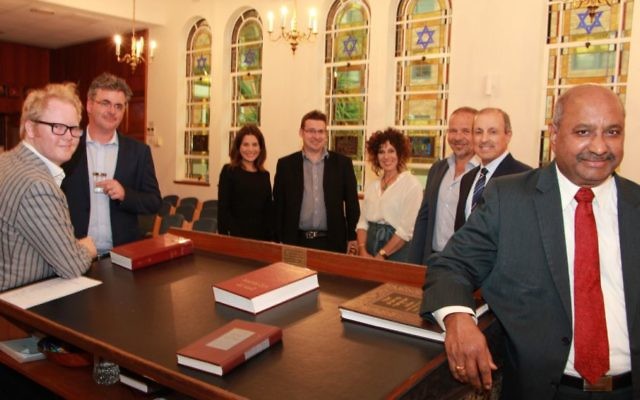Journo delegation reports back
They couldn't solve the Arab-Israeli conflict in a week, but an Australian media delegation to Israel described their trip as “invaluable".

THEY could not solve the Arab-Israeli conflict in a week, but senior journalists from a record nine-member Australian media delegation to Israel have described their study trip as “an invaluable learning experience” that could only be gained from “being on the ground and having the opportunity to talk to both sides”.
Five of the participants on the NSW Jewish Board of Deputies-organised mission shared their observations with an audience of more than 150 at Emanuel Synagogue last Wednesday.
Highlights of their trip included flying over the Golan Heights, meeting politicians in the Knesset, inspecting bomb shelters in Sderot, visiting the Ziv Hospital where injured Syrian civilians are treated, and exploring Bethlehem, the Jewish settlement of Gush Etzion and the new Palestinian city of Rawabi.
“I was struck by the incredible multiculturalism of Israel,” Australian Financial Review journalist Luke Malpass said.
“We walked around Sderot, and with the bomb shelters there you have about 15 seconds to respond to a rocket that might come over from Gaza.
“Understanding the very human pressures that are faced was completely invaluable.”
Fairfax’s chief political reporter James Massola said he appreciated why security is such a high priority in Israel and how life could be difficult for both Palestinians and settlers in the West Bank, but he felt the presence of the latter “makes the prospects for peace rather more remote”.
“I have to say, they [Israeli settlements] stood out like a sore thumb,” Massola said.
But he added unless more pluralistic leaders are to succeed Palestinian president Mahmoud Abbas, “until then, I think security will trump peace”.
Daily Telegraph state political reporter Andrew Clennell was grateful for the balanced nature of the mission.
“We talked to [Palestinian politician] Mustafa Barghouti, who couldn’t be more hardline or one-sided, and we spoke with Arab-Israeli journalist Khaled Abu Toumeh, who was probably the most pro-Israel person that we met,” Clennell said.
All five spoke about the potential of Rawabi – a privately funded development near Ramallah designed to offer a modern lifestyle for up to 40,000 Palestinians.
Massola said Rawabi “offers something different to the kind of narrative of Palestinians suffering”.
Malpass added, “The surprising thing for me was that just about all political leaders in Palestine basically didn’t want to know about it.”
The delegation’s study tour to Israel was largely funded by the JCA Haberman Kulawicz Wolanski Fund, with support from JCA’s 10×10 campaign.
SHANE DESIATNIK

comments